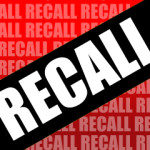 Nowadays it seems next to impossible to keep up with the number of items we see being recalled daily here in the United States. From toys to baby formula, vehicle parts, and medications; the list is overwhelming at times to know what is safe and what isn’t.
Nowadays it seems next to impossible to keep up with the number of items we see being recalled daily here in the United States. From toys to baby formula, vehicle parts, and medications; the list is overwhelming at times to know what is safe and what isn’t.
Last year, alone, consumers were faced with more than six drug recalls daily, said IndyStar.com, a worrisome statistic that has regulators and other experts concerned that consumers will ignore important recall information.
In 2011, the United States consumer saw a massive 2,363 recalls, which translates into some 6.5 recalls every day. Recalls involved consumer products, pharmaceuticals, medical devices, and food, according to information from the U.S. Food and Drug Administration (FDA), the Department of Agriculture (USDA), and the Consumer Products Safety Commission (CPSC), said IndyStar.com. In 2011, some 2,081 items were recalled; in 2007, there were 1,460 recalls.
“We’re experiencing recall fatigue in my mind at the consumer level and also at, perhaps, at the business level, and we all have to worry about that,” said Mike Rozembajgier, vice president of recalls for Stericycle ExpertRecall. The Indianapolis-based firm has assisted some key U.S. companies in implementing recalls, said IndyStar.com. “We have this growing concern for safety, but with there being so many recalls going on (is the public) paying attention to them and responding to them in a manner that is necessary for the recalls to be handled effectively?” he added.
According to experts, the rising number of recalls could be due to increased regulatory oversight; improved testing procedures; and better information delivery, such as social media, said IndyStar.com. Although sellers and the government struggle to reach consumers, a Rutgers study from 2009 revealed that not only had 12% of consumers eaten a food they knew had been recalled, 40% of consumers did not look in their homes for recalled products.
More and more, regulatory agencies and retailers are using Twitter, Facebook, telephone calls, and in-store postings to advise consumers about recalled products, but there is no guarantee every impacted consumer will be reached. “We don’t feel that our members are getting bombarded, but certainly the general public is, and sooner or later you don’t know what to believe,” Craig Wilson, Costco vice president for quality assurance and food safety, told IndyStar.com.
So who is to blame and what should happen to take care of this mounting problem?
Some are calling for one, uniform method. Today, the CPSC, USDA, and FDA use a different recall system, each with unique requirements, which makes handling the information difficult for everyone.
And, according to a study released earlier this year, the FDA does a poor job publicizing drug recalls and are not alerting doctors and patients as well as they could. The researchers discovered that, over eight years, the FDA did not send notifications for one out of five of the most serious recalls through its two electronic systems used to advise physicians and the public.
Research has also revealed that FDA warnings are not always effective. The study, published in the journal, Medical Care, involved a review of warnings about serious adverse events, recommendations against drug use in specific patient populations, cautions regarding drug-drug interactions, and calls for increased laboratory or clinical monitoring.
